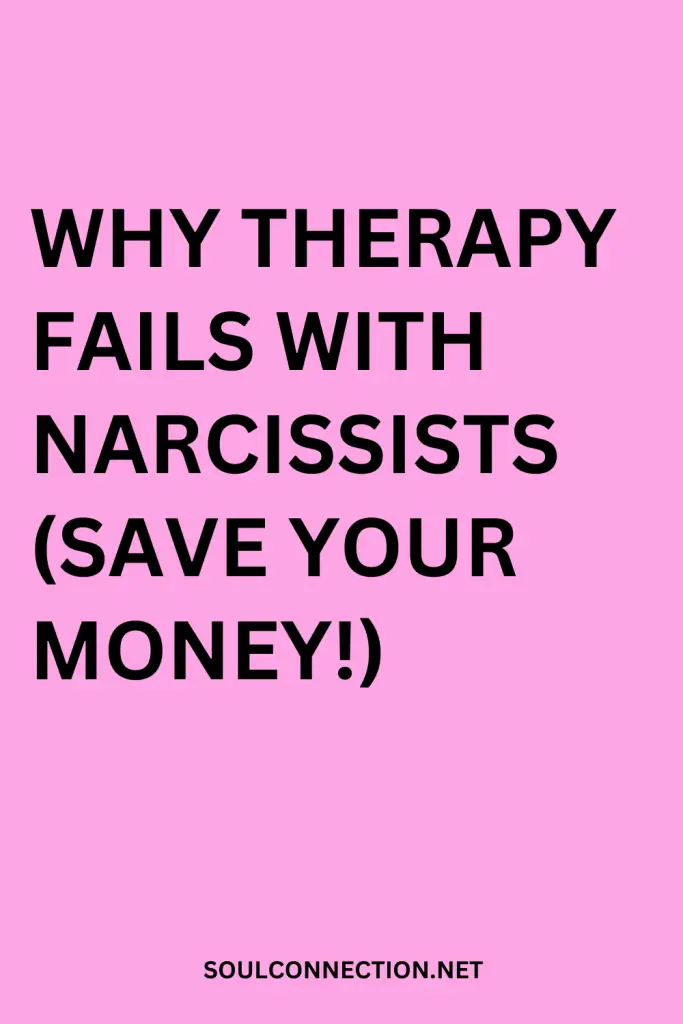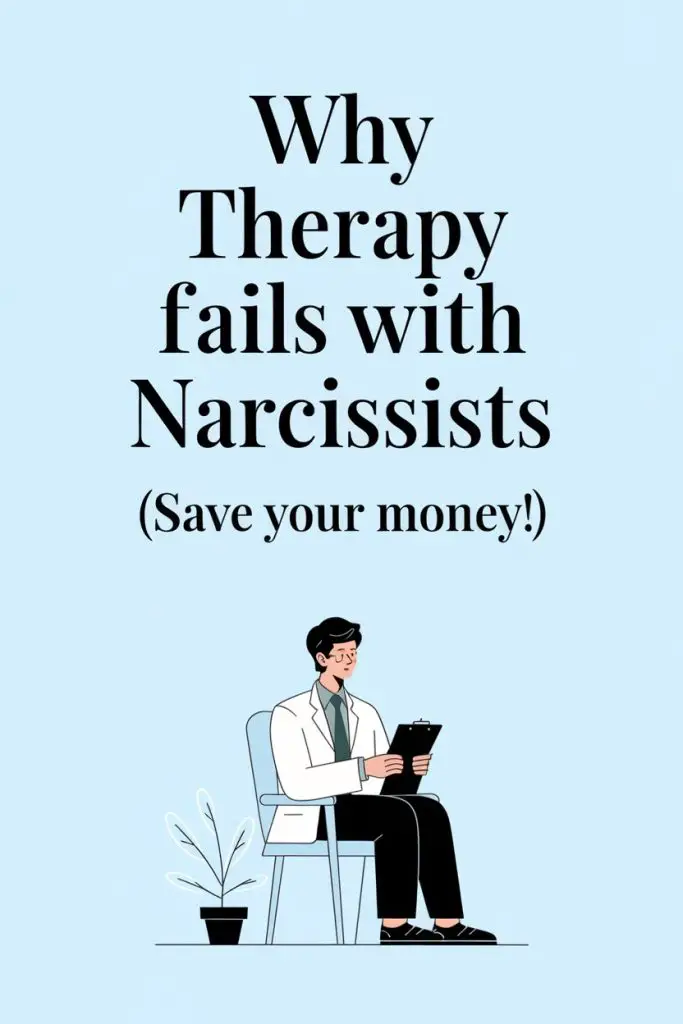Ever wondered why therapy—so often celebrated as the fix for everything but a broken dishwasher—seems to bounce right off narcissists?
There’s a reason why so many people trudge into the therapist’s office with hope, only to leave feeling like they’ve paid for a very expensive, emotionally draining magic trick that never quite works. Spoiler: It’s not you, it’s them.
Let’s peel apart why therapy rarely lands with narcissists, and how you can stop throwing good money (and hope) after bad.
The Therapy Illusion When Dealing with Narcissists
Therapy is built on the idea that both parties are invested in growth. Genuine conversation. Honest self-reflection. Maybe a few awkward silences, but all in service of slow, steady change.
Narcissists? They’re playing a different game entirely.
Most narcissists show up to therapy not because they want to change, but because they want to prove a point—or rescue their image.
Maybe it’s to appease a frustrated partner, look good for the kids, or tick a box in a custody battle. Rarely is it about owning up to their own patterns.
The moment the therapist hints that maybe—just maybe—some of the issues stem from their behavior, the narcissistic defense shields slam down.
And suddenly, you’re not in a therapist’s office; you’re in a courtroom where the therapist is cross-examined for daring to criticize their client.
The Art of Blame-Shifting
Therapists spend years training to spot subtle signs and work compassionately with difficult clients. Narcissists, meanwhile, have spent a lifetime sharpening the fine art of blame-shifting.
“I’m only mean because she nags me.”
“If he stopped complaining, I’d be more loving.”
“The therapist is clearly biased.”
Sound familiar? In couples therapy, narcissists often use the session as a stage to air their grievances—against you, the therapist, or anyone else in their emotional firing line.
Instead of exploring their responsibility, they treat therapy as an audition for ‘Victim of the Year.’
The result? Gaslighting, triangulation, and a whole lot of frustration for anyone actually hoping for progress.
Lack of Genuine Self-Reflection
Therapy asks for vulnerability. Narcissists offer bravado.
To benefit from therapy, a person needs to admit—at least to themselves—that they might contribute to the problems in their life. For a narcissist, that’s like asking a cat to organize a dog show: never going to happen.
The rare moments they do appear to reflect are often carefully crafted performances, designed to manipulate the therapist or score emotional points. It’s emotional smoke and mirrors, not true insight.
Without willingness to look inward, there’s no real progress. Therapy becomes an expensive, weekly rerun of the same old drama.
Manipulating the Therapist
Some narcissists even manage to turn therapy into their own personal chess game. The therapist is just another player to be outmaneuvered—someone to charm, bamboozle, or even seduce onto their side.
Watch for the narcissist’s classic moves:
- Showering the therapist with compliments (“You’re the only one who really gets me!”)
- Trying to turn the therapist against their partner (“You see how unreasonable she is, right?”)
- Withholding or distorting information to make themselves look better
This isn’t healing. This is reputation management.
Therapists are human. Even the best ones can be temporarily manipulated, leaving you feeling even more isolated and at fault.
Therapy Homework: The Dog Ate It
Therapists often assign exercises between sessions—communication tools, self-reflection prompts, maybe a journal or two. Narcissists excel at not doing them.
Excuses abound. “I didn’t have time.” “It didn’t seem relevant.”
Sometimes there’s outright sabotage, where the narcissist claims they did the homework but, funny enough, nobody else noticed any change.
If change starts at home, narcissists prefer to leave theirs in the lost and found.
When Progress Isn’t Progress
Every so often, a narcissist throws everyone a bone: temporary, surface-level change.
Maybe they start listening a bit more, or offer a real apology (that doesn’t come with a side of blame). Don’t be fooled.
This is often a calculated move—just enough to keep hope alive, or get someone off their back.
The moment the heat is off, old habits slither back in. It’s less “I’ve changed!” and more “I can fake it for a few weeks if I must.”
Long-term transformation? Not on the menu.
The Impact on Partners
Here’s the kicker: when therapy fails with a narcissist, it rarely just bounces off them. It ricochets back onto their partner.
You may leave sessions feeling gaslit, invalidated, or blamed. Instead of clarity or support, you feel more confused and alone.
Sometimes, the narcissist even uses what’s said in therapy as new ammo at home.
“I told the therapist what you said. Even she thinks you’re overreacting.”
If this rings true, know you’re not alone—and you’re not imagining things.
When Therapy Actually Can Help (But Not How You Think)
While therapy hardly ever reforms a narcissist, it can be hugely valuable for partners. Individual sessions with a therapist who “gets” narcissism can help you untangle the confusion, rebuild boundaries, and regain your sense of reality.
Forget about fixing the narcissist. Invest in your own support. It’s the only therapy money truly well spent.
Couples therapy, unless you’ve found a unicorn therapist with steel nerves and a PhD in emotional jiu-jitsu, will often just prolong the cycle.
Solo therapy puts the focus back where it belongs: your healing, your choices, your sanity.
Red Flags Therapy Won’t Fix
Certain patterns are so deeply embedded, no therapist can talk them out of someone. Watch for these hallmarks of therapy-resistant narcissism:
- Refusing to own even a shred of responsibility
- Turning therapy into a blame game
- Using sessions to control or manipulate
- Dismissing the therapist’s advice outright
- Weaponizing therapy content at home
When these show up, you’re not at fault for therapy “not working.” There’s nothing you could have done differently, except perhaps leave the session a bit earlier and treat yourself to cake.
Practical Moves for Partners Who’ve Had Enough
If you’re living this merry-go-round, your options are clearer than they feel.
- Find your own therapist—one who understands narcissistic dynamics inside and out.
- Build a support network that sees you and believes you.
- Set firmer boundaries: you cannot force someone to change, but you can decide what you’ll tolerate.
- Stop attending couple’s therapy with someone who refuses to participate in good faith.
If things don’t improve after repeated attempts, the problem isn’t a lack of effort on your part.
What If You Still Want to Try?
Hope dies hard. Maybe you’re reading this with crossed fingers, wishing your partner is the exception.
If you’re determined to try therapy together, pick a therapist with experience confronting narcissistic patterns. Interview them first.
Ask about their approach to manipulative clients. Stay alert to shifts in blame and manipulation, and check in with yourself after every session:
Do you feel validated and supported, or more confused and self-doubting?
And if you start feeling worse, give yourself permission to hit pause. There’s courage in walking away from a bad investment.
Investing in Yourself Pays Off
Therapy with a narcissist can feel like pouring tea into a sieve: exhausting, futile, and not nearly as relaxing as you’d hoped.
Shifting the focus to your own recovery, support, and education is the best way to stop throwing money at a lost cause. Your time and energy are precious. Spend them where you’re truly seen and heard.
No shame in closing your wallet to therapy that only serves to keep the narcissist happy (or angrier). No shame in redirecting those funds—maybe even to a holiday where nobody critiques your suitcase packing.
You deserve peace, not perpetual confusion.
When It’s Time to Call It
Therapy can be a wonderful tool—for people willing to pick it up. With narcissists, it’s often wielded as a prop, not a solution.
If what you’re reading feels uncomfortably familiar, trust your gut. Save your money for support that actually supports you.
And remember, you’re not alone—there’s a world of people who’ve survived the narcissist-therapy circus, and come out stronger on the other side.
Sometimes the healthiest step isn’t one more session. It’s the walk out the door.


